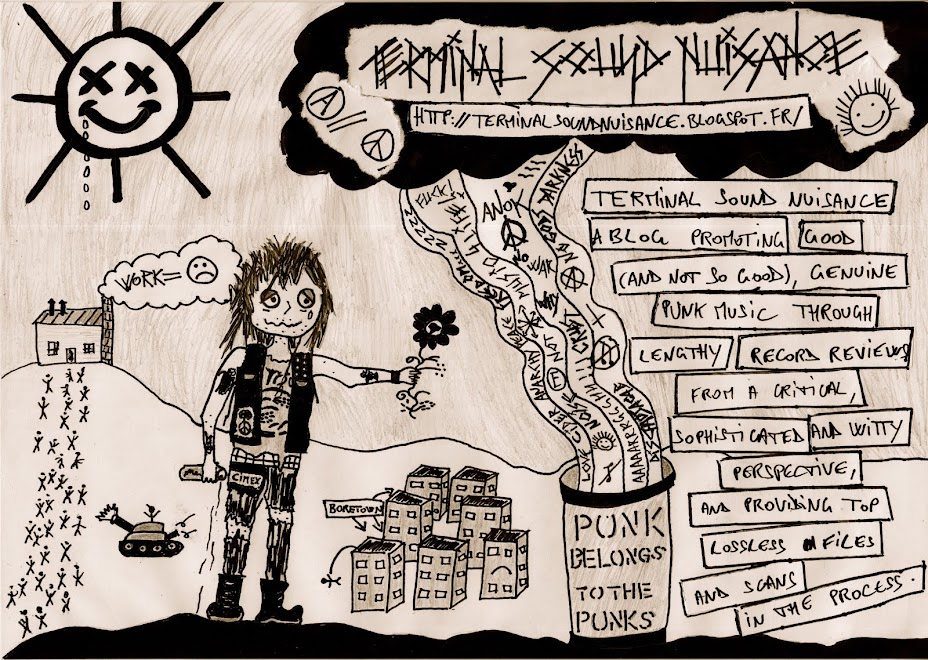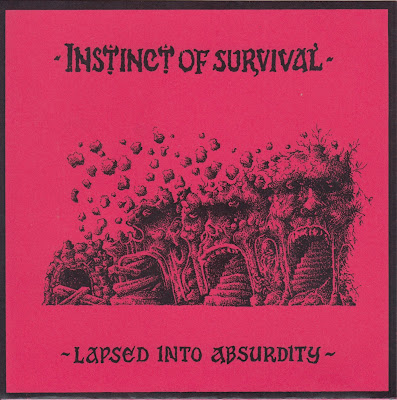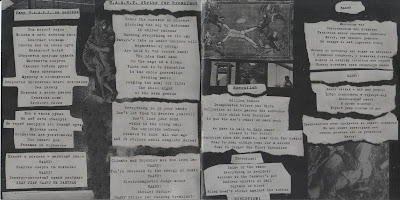I am not sure about where I stand on one-man bands. On the one hand, the inherent absence of a proper group dynamics in the music-making process can be seen as a downside and the music becomes very much personal and personalized (that and the fact that the artist may not necessarily be as proficient in all the instruments). On the other, a one-man band implies another way of writing music and can result in a very focused, cohesive, uncompromising result (assuming the technical abilities allows the creator to do so), especially if you are a particularly obsessive person who likes to write music on one's own and cannot be arsed with the bass player always showing up late at rehearsals or with the drummer's tendency to add double bass parts whenever someone is not looking. A one-man crust band is a tricky business but it also implies a love and dedication to the music that I find admirable and a literal application of the DIY spirit. The lovely bloke responsible for Παροξυσμός is Βαγγέλης (aka Vangelis) and he is from Greece (you had figured this one out, hadn't you?), Athens to be specific.
I think I first heard about Παροξυσμός on Crust Demos, a blog that focuses in reviewing and promoting new demos from crust/grind/d-beat/noisy bollox acts with a tireless, almost masochistic, energy that is awe-inspiring. But it was not the first time I had come across Vangelis' passion for gruff crust (grust?) since, prior to Παροξυσμός, he had another one-man band called Diseptic that released a split tape with Wormrot in 2008, a grindcore band from Singapore that recently recorded an album for Earache. To be honest, there are few actual similarities between Diseptic and Παροξυσμός and, if I hadn't known beforehand that they both had the same Frankenstein, as well-trained to the arts of crust as my notorious ears might be, I would have been clueless. To be brief, Diseptic sounded like a boisterous street brawl between Disrupt and Warsore, one that was rather enjoyable if you like the discipline (I do) and more generally if you are interested in music that sounds like it was recorded in an abandoned sewer. I have no idea what happened in the ensuing years, between the death of Diseptic and the birth of Παροξυσμός, but a demo of the latter, entitled "Χημικά Κατάλοιπα" (or "Chemical residues") emerged in digital format in mid-2013.
Not really craving to be in touch with the passions of the populace, I am quite unfamiliar with the ways in which today's commoners declare themselves. Rumours of selfies and snapchats have reached Terminal Sound Nuisance's ivory towers but they were only met with appalled bemusement and circumspect stupefaction. I do know one thing though, that if someone had given me "Χημικά Κατάλοιπα" as a present, I would have married that person on the fucking spot. The effects of Greek crust's seductive power are that strong. Forthrightly put, Παροξυσμός is basically a one-man tribute to vintage Greek crust and thrashy hardcore and there is a profoundly romantic idea behind this concept that greatly appeals to me (granted, I am a huge sucker for that sound and therefore utterly partial). I have already written about Greek crust on several occasions (when dealing with Ρήγμα, Ανάσα Στάχτη and Πανικός) so you might already be aware of my stance on the subject and how I consider Greece to have been one of the three most important places crust-wise in terms of quantity, quality and creativity for almost a decade. So of course, when I read about a band trying to recreate that sound, I was about as excited as a gran at a Julio Iglesias concert.
Upon hearing the demo, I must confess that I initially and wrongly thought a drum machine had been used on the recording, which gives you an indication of the metronomic tightness of the drumming. I guess you could say Vangelis is a human drumming machine then. The mastery of the rhythm section is truly impressive and there are moments when the skills really shine but fortunately never so much as to overshadow or suffocate the songs and the other instruments and, overall, we are still in raw crust territory. "Χημικά Κατάλοιπα" adds an old-school grindcore influence (akin to Filthy Christians or Unseen Terror for the thrashiest bits) to the traditional apocalyptic crust sound of Greece, a recurring trait in Παροξυσμός' work. Despite some production flaws (keep in mind that it is a demo) this first recording conveys a sense of focus and direction that is impressive. The riffs are excellent, simple in themselves but always adequate and powerful, dark and aggressive without feeling too intentional and, if the guitar sound lacks a little crunch, the texture is still right. The drumming offers plenty of variations, yet never overdoes them or overwhelms the listener. On the whole I feel the balance is good because of the songs' strength and of the thought-out articulate simplicity of the riffs. The vocals are absolutely crushing and you sometimes wonder if you have not come across an unreleased session from Χαοτικό Τέλος or Ξεχασμένη Προφητεία. They are hoarse and gruff but distinguishable, with that sense of forwardness and anger inherent to the Greek crust sound, sounding pessimistic yet combative.
I loved that demo to death and was clearly not the only one as it was released on a proper Lp in late 2014 by Scarecrow records (a strong Greek label that puts out new bands as well as reissues) and Weird Face Productions with "Χημικά Κατάλοιπα" on one side and (wait for it, wait for it) a tribute to classic Greek crust on the other, with top-shelf, flawless covers of Ναυτία, Ανάσα Στάχτη, Χαοτικό Τέλος, Άρνηση, Μάστιγα and Ξεχασμένη Προφητεία. Absolute Greek crust porn that pretty much made my year. To say that I was looking forward to a follow-up to the demo is an understatement and it came in the shape of the "Οι Θεοί Της Λήθης" Ep (it translates as "Gods of oblivion" in English) in December, 2013, thanks to Scarecrow, Weird Face, No Sanctuary (from Poland), Now or Never and Sabrota DIY (both from Greece). Unfortunately, the vinyl pressing was not exactly smooth and it ended up sounding too compressed and rough (which is why, on Vangelis' request, I included my own vinyl rip as well as the much better-sounding wav versions from the bandcamp in the file). I personally do not dislike the actual sound of the Ep, since it is the one I am accustomed to but truthfully, the files available for download on Παροξυσμός' bandcamp are far superior.
"Οι Θεοί Της Λήθης" contains six songs and is the logical continuity of the demo, a solid notch above it. Despite the Ep format, it displays a sense of narration and wholeness through the use of an intro and an outro (of sorts) that I find fitting for the genre. The opening minute of the opening eponymous song is made up of a rather thin-sounding, almost fragile and vulnerable, melancholy guitar part with the sound of thunder and falling rain in the background. It is not spectacular in itself but it works perfectly since it puts an emphasis on the following dark and groovy mid-paced crust that brings that threatening sense of epics that one traditionally associates with Greek crust, somewhere between Celtic Frost, Axegrinder and Antisect. The outro to the record is a marvelous instrumental metal crust number reminiscent of Coitus, Ξεχασμένη Προφητεία and more specifically nodding toward the immense Ψύχωση, who managed to pen hard-hitting, heavy, atmospheric crust instrumentals in the mid-90's (and it's not that easy when you think about it). Sonically, Παροξυσμός is perhaps thrashier and grindier than its crust forefathers and I am hearing a distinctive early grindcore influence (like Terrorizer or Filthy Christians) and, closer to home, riffs and arrangements that bring Πνευματική Διάψευση and Βιομηχανική Αυτοκτονία to mind. The mood is firmly rooted in the crust side of the force though and I would argue that the superb and diverse drumming musicianship (the beat variations and accuracy in the execution are breath-taking and almost machine-like at times), instead of dispersing and fragmenting it, which sometimes happens with too much technicality, serves and enhances that crust vibe. The riffs are dark, heavy and purposeful, familiar and correlating with the Greek crust canon but without ever being derivative. The guitar sound goes in that same direction, it has an appropriate texture, dirty and aggressive with a heaviness that is closely tied with the composition. As I mentioned, the vocals are to die for if you are into that type of sound (and if you are not, you may leave your Crust Membership card on the desk on your way out. Thanks for your cooperation.). They are highly reminiscent of Χαοτικό Τέλος and the likes, not only in their texture but also in how they flow and fit with the music, how they specifically convey anger, how confrontational and monumental and yet how spontaneous and vital they sound like. Just brilliantly done. On the whole, you could relevantly approach this Ep as a meaningful reactualization of the 90's Greek crust sound, which it uses as a clay, and of its creative spirit through the innovative insertions of grindcore elements, and the fact that it was a one-man operation possibly smoothens this process.
The foldout cover of "Οι Θεοί Της Λήθης" is a lovely, DIY-looking poster depicting an adequately morbid cut'n'paste design. The lyrics are mostly about religious and alienation, which is reflected in the cover which has an angry-looking Jesus whipping a poor bastard and whose overall aesthetics are, I feel, strongly reminiscent of 90's crust for the boldness. Following this Ep, Παροξυσμός released a top notch split Ep with Doomed Again in 2014 and a full album last year, entitled "Σἠψη Γενεών", that comes highly recommended. It might be even faster than the band's previous works and the lineup has changed as Vangelis is now helped in his crust quest with two actual persons on the guitar and the bass which has allowed Παροξυσμός to play live recently. A really strong Lp with a different but good production.
































